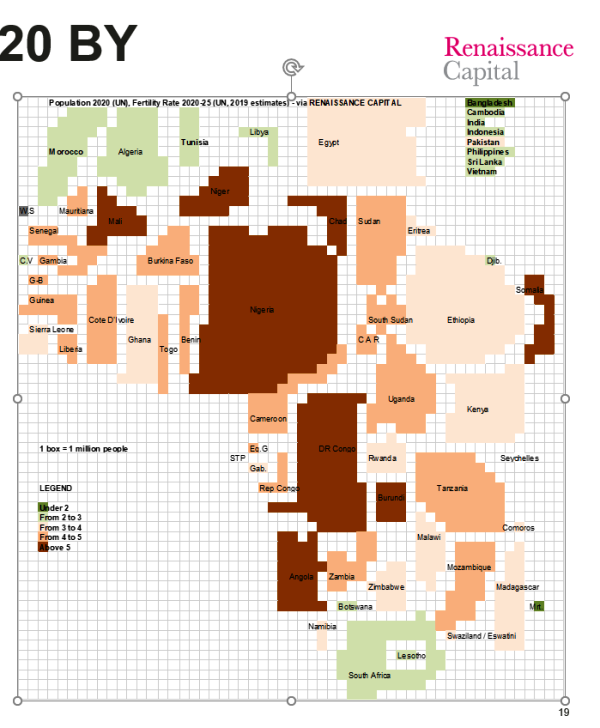By Robertson, Charlie
FRI 04 FEB, 2022-theGBJournal- Buhari’s focus on Nigeria’s population growth comes three years after our two major reports on this subject – and is so important that I’ve written The Time Travelling Economist (hopefully published in May 2022) making this the central theme. Fertility will play a key role in determining whether Africa follows Asia’s success or Latin America’s rockier developmental road.
Wednesday, I was outlining why it’s a big deal today to a Nigerian audience, at 50 mins in this youtube video.
UN demographic forecasts show that Nigeria is pretty well guaranteed to have widespread poverty in 2050. A high fertility rate means Nigeria’s population will not be able to grow deposits in the banking system, as a percentage of GDP. The shortage of cash will keep interest rates high. The high cost of borrowing money for investment means GDP growth will be low. Too few jobs will be created to meet the booming supply of labour from a country with a median age (today) of 16.
We know this is the case – because it has been the story for more than 50 years. And not just in Nigeria, but across many countries in SSA.
So it would be incredible if Nigeria could make progress on reducing child mortality rates. Over 10% of Nigerian children die before the age of 5, a fatality rate that is far in excess of better understood risks like COVID. When child mortality rates fall, so does fertility. And after that comes lower interest rates, more jobs, more growth etc.
Buhari mentioned girls education. When girls stay at school until they are 16 or 18, they might have their first child at 19 instead of their third child like those who left school at 12 or 13 might. Educated girls get jobs, earn money, push for education for their own children. It’s happened again and again around the world.
In 2005, Bangladesh and Nigeria had the same population of 139m. In 2021, Bangladesh was 166m and Nigeria was 211m. Since then Nigeria’s economy has grown by 4.3% a year, Bangladesh’s by 6.3%, and the former has partly been a lucky gain from oil, while the latter has been self-grown. Per capita GDP in Bangladesh has risen by 400% from $500 to $2,100. Nigeria’s has risen by 86%, from $1,220 to $2,273. Bangladesh is on track to be a huge success in the next 20 years. Nigeria is not on the right track to do this.
So it’s hugely important when a Nigerian president who is associated with the north, where educational access is more limited and fertility rates are higher, is prepared to back the sort of reforms that can transform Nigeria and make it look more Bangladesh in the future, rather than keep it stuck looking like the Nigeria of the past.
There is a big question is about implementation. The goals announced today are similar to those launched before, eg in 2008, and those targets have not been reached. But there has to be more chance of implementation when a president puts his support behind the policy, than when he doesn’t. Even if he has only one year left in office.
CONCLUSION: Just raising the issue is a much-needed victory for Nigeria’s future prosperity – that might convince local state governors to follow his lead. In a best-case, this could be copied by others on the continent from Niger to Angola.

Charlie Robertson is Global chief economist, Renaissance Capital| https://twitter.com/RencapMan| TED talk: Charles Robertson: Africa’s next boom – YouTube
Twitter-@theGBJournal|Facebook-The Government and Business Journal|email: govandbusinessj@gmail.com|










